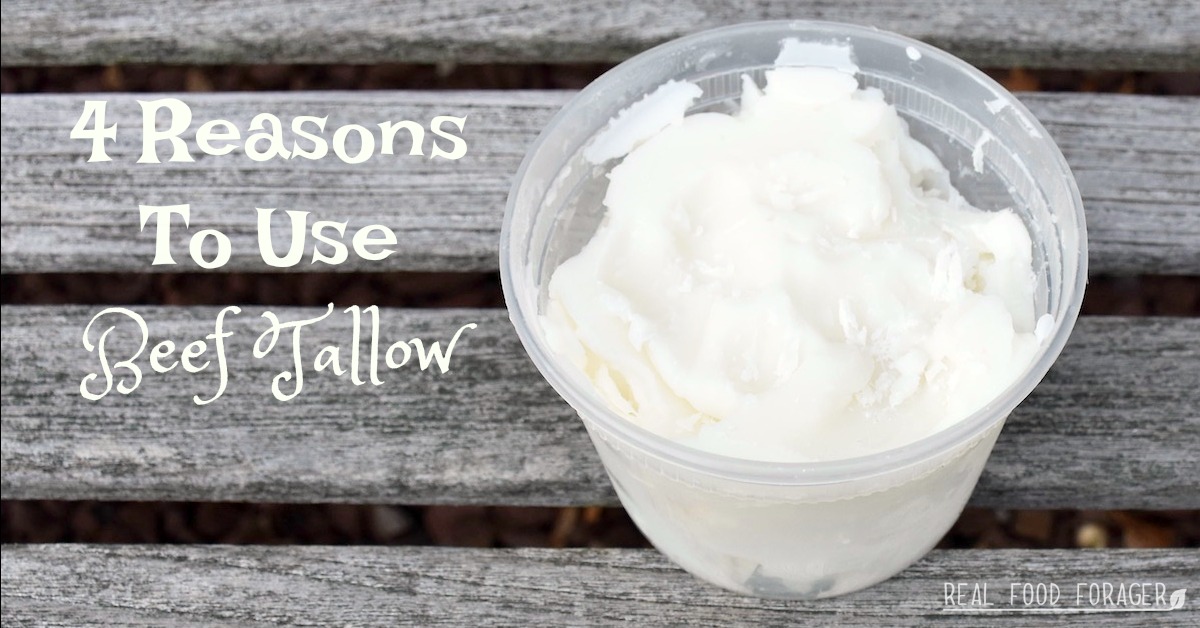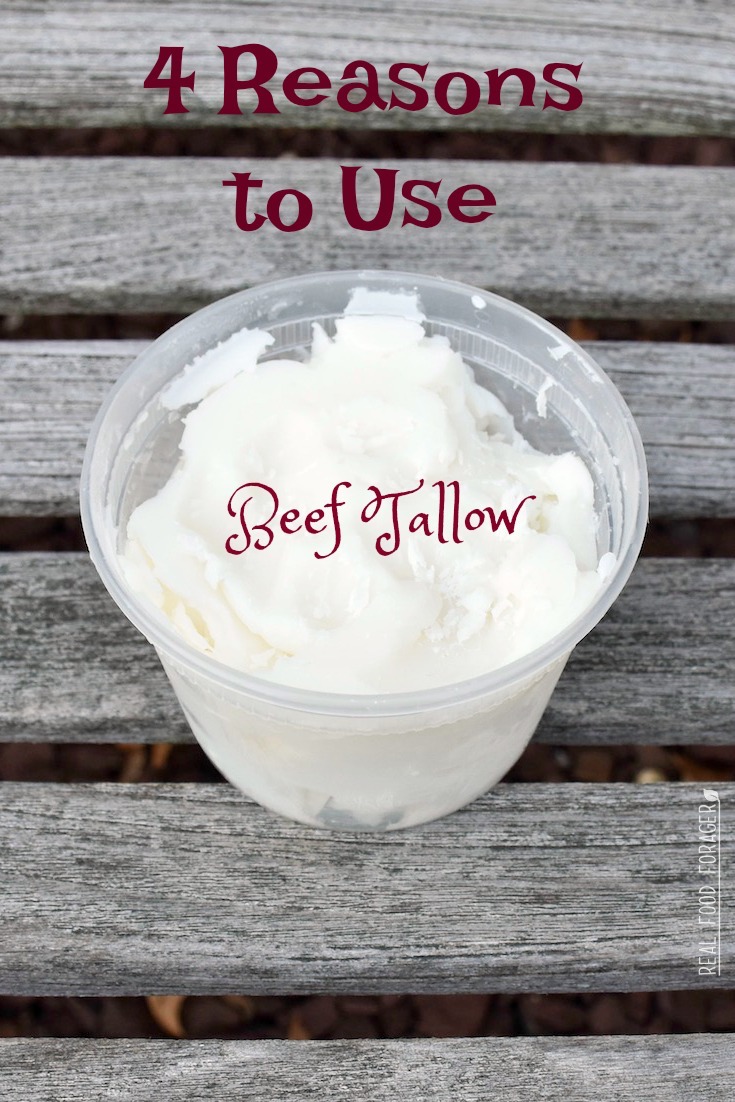
I just received a quart of beef tallow from my farmer (amazing what I can get excited about!) and tonight I’m going to fry something in it. Probably fish or crab cakes.
Traditionally, tallow was used for high heat frying in most fast food restaurants because it remained very stable under high heat conditions and imparted a good flavor. The switch was made in the 1970’s when the vegetable oil industry gained power and propagandized the (supposed) benefits of polyunsaturated fats (vegetable oils).
If saturated fats like tallow cause heart disease, then why is heart disease an epidemic today when hardly anyone uses tallow anymore?
Sadly, the USDA still encourages the use of these highly refined polyunsaturated seed and vegetable oils that are probably the greatest contributors to obesity, diabetes, heart disease and cancer.
The reason for this is that these vegetable oils are highly refined and processed with toxic elements and unnatural to the human body.
These vegetable oils are also unstable in heat situations and this causes them to oxidize. Oxidation breeds free radicals and free radicals damage cells, tissues and organs in the body.
This damage includes cell membrane damage which is the basis of many diseases.
In contrast, saturated fats from clean, healthy animals that are humanely raised on pasture and eat mainly grasses, are protective and necessary for the human body.
These are the fats our ancestors have eaten for centuries, way before oil refineries were established.
For high heat cooking, like deep frying, this is one of the best fats. Beef tallow remains stable, with a high smoke point and this will avoid oxidizing the fat and generating free radicals.
Cooking with vegetable oils causes a change in the cell membrane that causes it to be less effective.
Every cell in your body has a membrane that protects it by keeping the toxic elements out and the nutrients in. It is a double layer called a phospholipid membrane. You get the lipid part – it is made of fat.
More than half of the cell membrane is composed of saturated fat.
What happens when there is not enough saturated fat around? The body uses whatever fat is available. If this is trans fat because the person has been eating margarine or rancid vegetable oils – that is what will be incorporated into the cell membrane.
These fake fats have a different structure than the saturated fats and this creates breaks in the links of the phospholipid membrane. If the membrane is not sound, because of these unnatural fats, the potential for toxins to get into the cell increases and the potential for nutrients to flow out increases.
With fake fats in the membrane, it is no longer protective.
This is a set up for all kinds of diseases including heart disease, cancer, autoimmune diseases and other diseases of inflammation.
Saturated fat is protective of the cell membrane.
Saturated fat is also protective of the brain – but that is a topic for another article.
Beef tallow is protective against metastatic breast tumors.
Research conducted at The Department of Cell Biology and Human Anatomy, University of California, School of Medicine, Davis, CA, has shown that “Beef Tallow Increases the Potency of Conjugated Linoleic Acid in the Reduction of Mouse Mammary Tumor Metastasis.”
The title says it all.
This study showed that mice fed CLA (Conjugated Linoleic Acid) with beef tallow, had fewer metastatic breast tumors than another group that was fed vegetable fat blend. The authors concluded that the fatty acids in beef tallow actually enhanced the (known) anti tumor actions of CLA.
The authors state,
fatty acids normally found in beef tallow, such as oleic, stearic, and palmitic acids, either did not change or enhanced the cytolytic effects of CLA isomers on mouse mammary tumor cells in culture. These data provide evidence that dietary BT, itself with negligible levels of CLA, may increase the efficacy of dietary CLA in reducing mammary tumorigenesis.
According to the Weston Price Foundation,
Beef producers need to recognize that the fat is the most important part of the beef, rich in components that promote good health and that help you utilize the nutrients in all the other parts of the beef. In addition to vitamins A and D, fat contributes many important fatty acids, including palmitoleic acid, an antimicrobial fat that protects us against pathogens in the gut. (source)
Using beef tallow will also help protect the bones, as there is vitamin D in this fat. (However, lard is probably the better food source of vitamin D.)
Additionally,
… saturated fat which, in spite of what we’ve been told, plays many important roles in the body chemistry. The scientific literature delineates a number of vital roles for dietary saturated fats—they enhance the immune system,32 are necessary for healthy bones,33 provide energy and structural integrity to the cells,34 protect the liver35 and enhance the body’s use of essential fatty acids.36 Stearic acid and palmitic acid, found in beef tallow and butter, are the preferred foods for the heart.37 As saturated fats are stable, they do not become rancid easily, do not call upon the body’s reserves of antioxidants, do not initiate cancer, do not irritate the artery walls. (source)
Eating naturally occurring fat soluble vitamins in foods (like vitamin D), along with saturated fat, helps with the absorption of the fat soluble vitamins in the intestines.
While there is a relatively small amount of vitamin D in tallow, compared to other food sources, the CLA adds to the benefit, as do the various forms of vitamin D that is found in foods.
Saturated fats like beef tallow provide an excellent form of energy for the human body to use. Many of the problems people have with metabolic syndrome, pre-diabetes and diabetes is due to the over abundance of sugars in the diet in the form of empty carbohydrate calories.
This requires a lot of insulin to regulate the blood sugar and to store the excess calories as fat. The constant need for insulin creates the problems of insulin resistance and this develops into diabetes.
If people would eat more (good) fat and less sugar they would be better off.
Tonight, my fish will be bathed in good clean beef tallow. It will taste delicious and – while the low fat demogogues would never admit it – it will be far more satisfying too!
Are you as fascinated by the microbiome as I am? Are you hoping for a cure through this new research explosion?
Learn how to make bone broth and soups full of collagen and gelatin in my ebook Beyond Broth – on sale today!
Check out my newest ebook, Heal Your Microbiome Optimize Your Health – on sale today!
Like this article? Get many more and tons of information and instructions on using grain free flours in my fantastic kindle books. You don’t need a kindle to read them, as Amazon offers a FREE reader for all devices, on the sales page for each book.
Grab my kindle books here!
Grain Free Paleo Breads
Grain Free Paleo Snacks
Grain Free Paleo Desserts and Treats
These recipes are suitable for Paleo, SCD, GAPS and all grain free eaters.


Inspire Your Real Food Healing Journey with my FREE Grain-Free Meals e-Cookbook and Getting Started email series and newsletter! Unsubscribe anytime. Privacy Policy